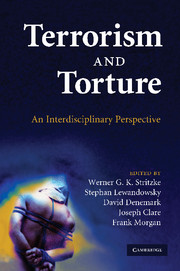Book contents
- Frontmatter
- Contents
- List of figures
- List of tables
- List of contributors
- Preface
- 1 The terrorism–torture link: when evil begets evil
- 2 Torture, terrorism, and the moral prohibition on killing non-combatants
- 3 The equivalent logic of torture and terrorism: the legal regulation of moral monstrosity
- 4 War versus criminal justice in response to terrorism: the losing logic of torture
- 5 Reducing the opportunities for terrorism: applying the principles of situational crime prevention
- 6 From the terrorists' point of view: toward a better understanding of the staircase to terrorism
- 7 If they're not crazy, then what? The implications of social psychological approaches to terrorism for conflict management
- 8 The cycle of righteous destruction: a Terror Management Theory perspective on terrorist and counter-terrorist violence
- 9 Misinformation and the “War on Terror”: when memory turns fiction into fact
- 10 Icons of fear: terrorism, torture, and the media
- 11 What explains torture coverage during war-time? A search for realistic answers
- 12 Reversed negatives: how the news media respond to “our” atrocities
- 13 Terrorism and TV news coverage of the 2001 Australian election
- 14 Terrorism, anxiety, and war
- 15 I'm right, you're dead: speculations about the roots of fanaticism
- 16 Reducing terrorist risk: integrating jurisdictional and opportunity approaches
- Index
- References
3 - The equivalent logic of torture and terrorism: the legal regulation of moral monstrosity
Published online by Cambridge University Press: 15 September 2009
- Frontmatter
- Contents
- List of figures
- List of tables
- List of contributors
- Preface
- 1 The terrorism–torture link: when evil begets evil
- 2 Torture, terrorism, and the moral prohibition on killing non-combatants
- 3 The equivalent logic of torture and terrorism: the legal regulation of moral monstrosity
- 4 War versus criminal justice in response to terrorism: the losing logic of torture
- 5 Reducing the opportunities for terrorism: applying the principles of situational crime prevention
- 6 From the terrorists' point of view: toward a better understanding of the staircase to terrorism
- 7 If they're not crazy, then what? The implications of social psychological approaches to terrorism for conflict management
- 8 The cycle of righteous destruction: a Terror Management Theory perspective on terrorist and counter-terrorist violence
- 9 Misinformation and the “War on Terror”: when memory turns fiction into fact
- 10 Icons of fear: terrorism, torture, and the media
- 11 What explains torture coverage during war-time? A search for realistic answers
- 12 Reversed negatives: how the news media respond to “our” atrocities
- 13 Terrorism and TV news coverage of the 2001 Australian election
- 14 Terrorism, anxiety, and war
- 15 I'm right, you're dead: speculations about the roots of fanaticism
- 16 Reducing terrorist risk: integrating jurisdictional and opportunity approaches
- Index
- References
Summary
A startling equivalence marks the logic employed by those who would defend democratic life and governments from terrorism by resorting to torture, and those who justify terrorism itself as a defense against excessive governmental power. Torture by the counter-terrorist state is sometimes seen as a necessary and convenient way of combating the threat of terrorism, as if the great evil of terrorism cancels out the lesser evil of torture. After September 11, 2001, arguments in favor of official torture penetrated deep into parts of the legal bureaucracy, political establishment, and academic circles in the United States, just as torture had sometimes been favorably viewed in earlier counter-terrorist campaigns, such as in French Algeria, Northern Ireland, and the Israeli-occupied territories. Similarly, some terrorist groups and their supporters justify their violence by appealing to various rhetorical, ideological, and moral claims about the necessity of terrorism in struggles of various kinds against oppression, authoritarianism, occupation, or other forms of domination or hegemony.
The equivalent logic of terrorists and torturers is manifest in three key techniques of argumentation: first, a paradoxical appeal to the language of human rights to justify torture and terrorism; secondly, arguments about asymmetry of power necessitating resort to terrorism or torture; and thirdly, a series of strategies invoked to justify the use of the exceptional means (of torture or terrorism) to achieve just causes.
- Type
- Chapter
- Information
- Terrorism and TortureAn Interdisciplinary Perspective, pp. 44 - 62Publisher: Cambridge University PressPrint publication year: 2009



